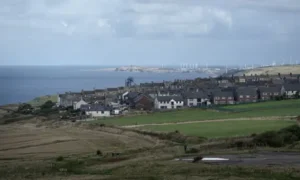From The Guardian
Michael Gove said UK needed coal to make steel, but business department papers drafted around same time say it will not

Previously unseen documents have emerged that appear to contradict the government’s case for a new coalmine in Cumbria.
When Michael Gove, the levelling up secretary, approved plans to build the Woodhouse Colliery near Whitehaven in December 2022, he said the UK would need the coal in order to carry on making steel.
But the newly revealed documents, drafted around the same time at the then Department for Business, Energy and Industrial Strategy (BEIS), say the opposite. According to these papers, officials predict with “high certainty” that technology such as electric arc furnaces will lead to the successful decarbonisation of UK steel production by 2035.
“This new information blows a gaping hole in the government’s case for supporting the proposed Cumbria coalmine,” said Tony Bosworth of Friends of the Earth.
“When Michael Gove approved the mine 14 months ago, he claimed it was needed because there was huge uncertainty over UK steel’s ability to decarbonise over the next 15 years.
“Now we discover that at the same time, government officials had ‘high certainty’ about the industry’s move away from coal.”
The documents were disclosed to Friends of the Earth by the Department for Energy Security and Net Zero (DESNZ), the successor to BEIS, as part of legal action the environmental campaign group is taking against the government’s climate plan.
Written in preparation for the government’s 2023 carbon budget delivery plan, the “risk tables” analyse potential threats to the policies in the plan, published last March.
Setting a target for all steelmaking to be electrified by 2035, the document says: “We have high certainty in the delivery of this policy … due to the deliverability and confidence in steel-making decarbonisation technologies being considered which impact the majority of the emission reductions (such as using electric arc furnaces).”
Steel is made by putting iron ore or recycled scrap steel through an intense heating process. Traditionally this was done in coal-fired blast furnaces, but modern electric arc furnaces use a direct electrical current to create the high temperatures needed. Such technologies, which emit a fraction of the carbon of traditional coal-fired blast furnaces, “have been in use for decades and [have] proven emissions savings”, the BEIS document says.
The position is at odds with that taken by Gove when he approved the new mine. In his letter granting planning permission, Gove said there was “no certainty” arc furnaces or any other alternative technologies would significantly alter steel production, and the UK needed a continuing supply of metallurgical coal for years to come.
“It is clear that the European and UK steel industry is currently reliant on a supply of suitable metallurgical coal, and further … whilst there is a prospect that this reliance may decrease in the UK and Europe over the lifetime of the development, the evidence suggests that there would still remain a market for the coal,” he said.
With an expected production capacity of about 2.8m tonnes of coal a year, the £165m Woodhouse Colliery would create 500 jobs locally, with advocates seeing it as a means of “levelling up” deprived parts of north-west England. But Gove overruled significant opposition to approve the mine, including from senior colleagues in his own party.
Sir Alok Sharma, the MP for Reading West, who was the president of Cop26, the UN climate summit, when it took place in Glasgow, described the mine as “a backward step”. Lord Deben, then the chair of the Climate Change Committee (CCC), called it “indefensible”. According to a projection by the CCC, the mine would add 400,000 tonnes of CO2 emissions every year.
The closure of the UK’s last remaining blast furnaces, British Steel’s site in Scunthorpe and Tata Steel’s in Port Talbot, have cast further doubts on the case for the mine. Both companies have said they want to upgrade to electric arc furnaces and the government has pledged at least £500m towards Tata Steel’s transition efforts, with similar levels of support expected for British Steel.
Bosworth said: “The confusion over the government’s policy on steel is astonishing. On the one hand the government claims the UK steel industry needs coal for decades to come, and on the other it is offering hundreds of millions of pounds of taxpayers’ money to help the industry rapidly decarbonise.
“This muddled government thinking has to stop. Ministers from every government department must accept that the steel industry is moving away from coal and withdraw support for this unnecessary and destructive mine. This would also help restore the UK’s global credibility on climate change.
“Ministers should put areas like west Cumbria at the heart of a green industrial strategy, create new jobs and business opportunities and put the region at the forefront of building the cleaner future we urgently need.”
Friends of the Earth is currently taking the government to court over the new mine. Gove’s Department for Levelling Up, Housing and Communities declined to comment, citing the continuing legal action. DESNZ did not respond to a request for comment.


